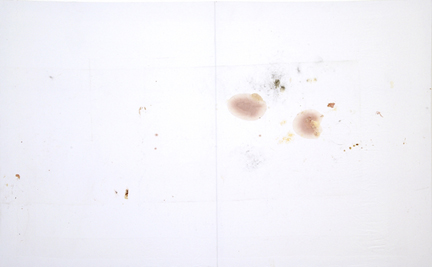
Double fond © The Fair Gallery
For Frieze 2007, The Fair Gallery invited Aurelie Voltz to curate its stand : refusing the imposed model of commercial art environment, she turned the space into a domestic room, a jigsaw set-up inspired by the symbolics of Bachelard's Poetics of space with different artists' works interlaced around the themes of memory and intimacy.
Its title" Double fond " seemed to twist the conventional gallery's aim giving the art objects a second life. From time to time, a mother came on the stand to teach her young child to walk, a non normative, nearly invisible performance by Roman Ondak that positioned Double fond outside of the material realm.

Enigma 2 © Reena Spaulings
For Frieze 2009, Reena Spauling Gallery showcases Claire Fontaine's famous neons : their absence leaving space for a billing note.
Claire Fontaine reduces the contemporary art scene inspirations to dinner parties' conversations, a motto that borrows from Guy Debord's anticapitalist ideas and from the Situationists' fake exhibitions, a concept successfully transcended in Reena Spaulings' minimalists canvases, Enigmas 3 & 4 : Table cloth for Atforum dinner, Art Basel Miami. Since Reena Spaulings duplicated the original concept in numerous copies, it proved financially successful - the anti-consumerist, anti-bourgeois objective also reaching a place counter-productive to what is initially claimed.

The great white hope © Marisa Argentato & Pasquale Pennacchio © T293
T293, a gallery which stand is intriguingly seductive in its minimalist choice is also part of Frieze 2009. T293 is designed like an empty shop by artists Marisa Argento and Pasquale Pennacchio, mounted like a platform of shelves and dressed with neo-conceptual neons. There is no work on display, the artists are represented by their catalogues : like Claire Fontaine and her detournements that challenge the notions of authorship.
One can think of the vacuity of the art fair, of the collecting of objects devoid of their essence once serving the sole purpose of being sold, their absence-presence on the booth questioning their newly gained status.
Special thanks to T293 gallery

